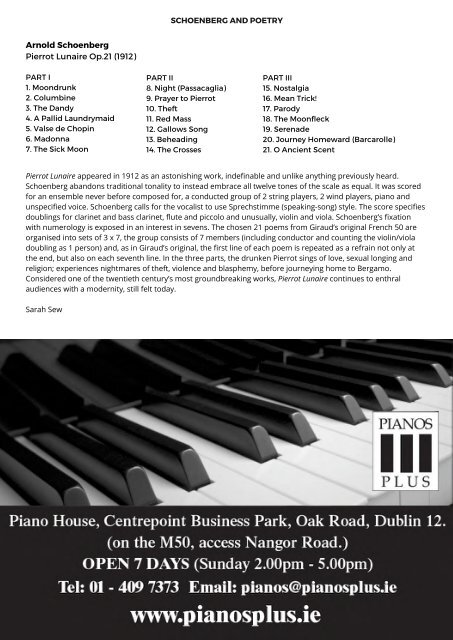Beckett Chamber Music Series 2018 Programme
Beckett Chamber Music Series explores the connection between words and music – thematically, expressively, spatially and temporally – inspired by Samuel Beckett's reduction of artistic expression into a medium which is something in between these two things. The 2018 Series brings together an ensemble of Ireland's finest musicians for intensive musical and artistic discovery, to be shared with audiences in three concert programmes featuring major chamber works by Arnold Schoenberg combined with rarely performed works by Irish composer John Larchet, Swiss composer Frank Martin, a new commission by Irish composer Sebastian Adams, and culminates in a performance of Beckett’s radio play Words and Music with Morton Feldman’s 1987 score. The performance of Words and Music is in collaboration with Everett Frost, who produced and directed the award-winning American national broadcast premieres of Beckett's five completed radio plays and features internationally recognised actors Barry McGovern and Stephen Brennan.
Beckett Chamber Music Series explores the connection between words and music – thematically, expressively, spatially and temporally – inspired by Samuel Beckett's reduction of artistic expression into a medium which is something in between these two things.
The 2018 Series brings together an ensemble of Ireland's finest musicians for intensive musical and artistic discovery, to be shared with audiences in three concert programmes featuring major chamber works by Arnold Schoenberg combined with rarely performed works by Irish composer John Larchet, Swiss composer Frank Martin, a new commission by Irish composer Sebastian Adams, and culminates in a performance of Beckett’s radio play Words and Music with Morton Feldman’s 1987 score. The performance of Words and Music is in collaboration with Everett Frost, who produced and directed the award-winning American national broadcast premieres of Beckett's five completed radio plays and features internationally recognised actors Barry McGovern and Stephen Brennan.
You also want an ePaper? Increase the reach of your titles
YUMPU automatically turns print PDFs into web optimized ePapers that Google loves.
Pierrot Lunaire appeared in 1912 as an astonishing work, indefinable and unlike anything previously heard.<br />
Schoenberg abandons traditional tonality to instead embrace all twelve tones of the scale as equal. It was scored<br />
for an ensemble never before composed for, a conducted group of 2 string players, 2 wind players, piano and<br />
unspecified voice. Schoenberg calls for the vocalist to use Sprechstimme (speaking-song) style. The score specifies<br />
doublings for clarinet and bass clarinet, flute and piccolo and unusually, violin and viola. Schoenberg’s fixation<br />
with numerology is exposed in an interest in sevens. The chosen 21 poems from Giraud’s original French 50 are<br />
organised into sets of 3 x 7, the group consists of 7 members (including conductor and counting the violin/viola<br />
doubling as 1 person) and, as in Giraud’s original, the first line of each poem is repeated as a refrain not only at<br />
the end, but also on each seventh line. In the three parts, the drunken Pierrot sings of love, sexual longing and<br />
religion; experiences nightmares of theft, violence and blasphemy, before journeying home to Bergamo.<br />
Considered one of the twentieth century’s most groundbreaking works, Pierrot Lunaire continues to enthral<br />
audiences with a modernity, still felt today.<br />
Sarah Sew


